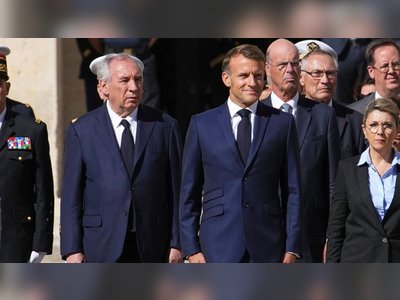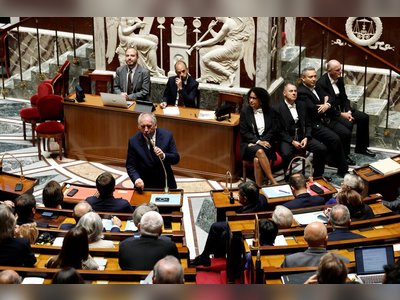Macron Appoints Sébastien Lecornu as Prime Minister Amid Budget Crisis and Political Turmoil
Outgoing defence minister replaces François Bayrou with mandate to build consensus across a fractured parliament and advance the 2026 budget
French President Emmanuel Macron has appointed outgoing Defence Minister Sébastien Lecornu as Prime Minister following the resignation of François Bayrou after a vote of no confidence.
Bayrou served just nine months in office.
He tendered his resignation after failing to deliver on an unpopular deficit‑reduction plan.
Ahead of his departure, he warned lawmakers: “You have the power to bring down the government, but you do not have the power to erase reality.
Reality will remain relentless: expenses will continue to rise, and the burden of debt, already unbearable, will grow heavier and more costly”.
Lecornu, aged thirty‑nine, inherits a dual challenge: navigating France’s deepening financial strain while responding to widespread public unrest.
A nationwide campaign under the slogan “Block Everything” is scheduled for Wednesday, with a broader union‑led strike planned for September eighteenth.
Authorities are preparing for potential infrastructure disruptions, seizures, and elevated social tension.
The presidency has charged Lecornu with consulting all political factions represented in Parliament to secure adoption of the fiscal 2026 budget and to forge the necessary political agreements for upcoming decisions.
Political analysts trace the current instability to Macron’s decision to dissolve the National Assembly following strong far‑right gains in the 2024 European elections.
That gamble resulted in a divided Assembly and a succession of short‑lived governments.
France’s Fifth Republic was originally designed to ensure stability through strong executive powers and a majority system.
Since 2017, Macron has disrupted that tradition by forming his own centrist movement, upending the longstanding left‑right alternation.
Re‑elected in 2022, Macron’s parliamentary majority eroded as voters gravitated toward political extremes, and he was increasingly forced to invoke Article Forty‑nine point three of the Constitution to pass legislation.
Following the snap election, the fragmented National Assembly prevented the formation of a conventional coalition.
The left, despite winning a plurality in the second round, failed to secure a majority.
Its bid to install its own prime minister collapsed after Macron declined to endorse its candidate.
Observers note that by choosing a loyalist like Lecornu rather than reaching across to opposition figures, Macron risks appearing tone‑deaf to the electoral reality.
Lecornu is the only minister to have served continuously since Macron’s initial term began in 2017.
His appointment reflects a preference for continuity and loyalty, though achieving a compromise with Socialist lawmakers seems increasingly improbable, given their demands to tax the wealthy and reverse business tax cuts—positions at odds with Lecornu’s conservative orientation.
One potential path to stability lies in shared opposition to another snap election.
Neither the left nor the right wants to empower the far‑right National Rally through early elections, which may motivate reluctant cooperation—albeit within limits.
France’s economic outlook is also under strain.
Borrowing costs have surged: ten‑year bond yields have risen to levels nearly matching Italy’s and exceeding those in Spain, Portugal, and Greece.
Markets now consider France part of the eurozone’s “periphery” of riskier debtors.
A ratings downgrade is under review, and France’s debt‑to‑GDP ratio—already over one‑hundred and thirteen percent—is projected to reach one‑hundred and eighteen percent by 2026.
Recent polling suggests that in the event of another snap election, the far‑right would emerge first, with the left second and Macron’s centrist bloc trailing in distant third—fueling fears of a prolonged political realignment.
With public trust in political institutions at historic lows and mass protests imminent, France finds itself at a critical crossroads between a system that no longer functions and one not yet imagined.
Bayrou served just nine months in office.
He tendered his resignation after failing to deliver on an unpopular deficit‑reduction plan.
Ahead of his departure, he warned lawmakers: “You have the power to bring down the government, but you do not have the power to erase reality.
Reality will remain relentless: expenses will continue to rise, and the burden of debt, already unbearable, will grow heavier and more costly”.
Lecornu, aged thirty‑nine, inherits a dual challenge: navigating France’s deepening financial strain while responding to widespread public unrest.
A nationwide campaign under the slogan “Block Everything” is scheduled for Wednesday, with a broader union‑led strike planned for September eighteenth.
Authorities are preparing for potential infrastructure disruptions, seizures, and elevated social tension.
The presidency has charged Lecornu with consulting all political factions represented in Parliament to secure adoption of the fiscal 2026 budget and to forge the necessary political agreements for upcoming decisions.
Political analysts trace the current instability to Macron’s decision to dissolve the National Assembly following strong far‑right gains in the 2024 European elections.
That gamble resulted in a divided Assembly and a succession of short‑lived governments.
France’s Fifth Republic was originally designed to ensure stability through strong executive powers and a majority system.
Since 2017, Macron has disrupted that tradition by forming his own centrist movement, upending the longstanding left‑right alternation.
Re‑elected in 2022, Macron’s parliamentary majority eroded as voters gravitated toward political extremes, and he was increasingly forced to invoke Article Forty‑nine point three of the Constitution to pass legislation.
Following the snap election, the fragmented National Assembly prevented the formation of a conventional coalition.
The left, despite winning a plurality in the second round, failed to secure a majority.
Its bid to install its own prime minister collapsed after Macron declined to endorse its candidate.
Observers note that by choosing a loyalist like Lecornu rather than reaching across to opposition figures, Macron risks appearing tone‑deaf to the electoral reality.
Lecornu is the only minister to have served continuously since Macron’s initial term began in 2017.
His appointment reflects a preference for continuity and loyalty, though achieving a compromise with Socialist lawmakers seems increasingly improbable, given their demands to tax the wealthy and reverse business tax cuts—positions at odds with Lecornu’s conservative orientation.
One potential path to stability lies in shared opposition to another snap election.
Neither the left nor the right wants to empower the far‑right National Rally through early elections, which may motivate reluctant cooperation—albeit within limits.
France’s economic outlook is also under strain.
Borrowing costs have surged: ten‑year bond yields have risen to levels nearly matching Italy’s and exceeding those in Spain, Portugal, and Greece.
Markets now consider France part of the eurozone’s “periphery” of riskier debtors.
A ratings downgrade is under review, and France’s debt‑to‑GDP ratio—already over one‑hundred and thirteen percent—is projected to reach one‑hundred and eighteen percent by 2026.
Recent polling suggests that in the event of another snap election, the far‑right would emerge first, with the left second and Macron’s centrist bloc trailing in distant third—fueling fears of a prolonged political realignment.
With public trust in political institutions at historic lows and mass protests imminent, France finds itself at a critical crossroads between a system that no longer functions and one not yet imagined.










